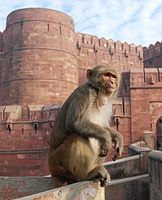
Photo from wikipedia
BACKGROUND Red blood cell (RBC) membrane-associated blood group systems are clinically significant. Alloimmunisation is a persistent risk associated with blood transfusion owing to the antigen polymorphisms among these RBC-associated blood… Click to show full abstract
BACKGROUND Red blood cell (RBC) membrane-associated blood group systems are clinically significant. Alloimmunisation is a persistent risk associated with blood transfusion owing to the antigen polymorphisms among these RBC-associated blood groups. Next-generation sequencing (NGS) offers an opportunity to characterize the blood group variant profile of a given individual. Australia comprises a large multiethnic population where most blood donors are Caucasian and blood group variants remain poorly studied among Indigenous Australians. In this study, we focused on the Tiwi Islanders, who have lived in relative isolation for thousands of years. METHODS AND MATERIALS We predicted the blood group phenotype profiles in the Tiwi (457) and 1000 Genomes Phase 3 (1KGP3-2504) cohort individuals using RBCeq (https://www.rbceq.org/). The predicted phenotype prevalence was compared with the previous literature report. RESULTS We report, for the first time, comprehensive blood group profiles corresponding to the 35 known blood group systems among the Indigenous Tiwi islander population and identify possible novel antigen variants therein. Our results demonstrate that the genetic makeup of the Tiwi participants is distinct from that of other populations, with a low prevalence of LU (Au[a-b+]) and ABO (A2) and D+C+c+E+e- phenotype, an absence of Diego blood group variants, and a unique RHD (DIII type4) variant. CONCLUSION Our results may contribute to the development of a database of predicted phenotype donors among the Tiwi population and aid in improving transfusion safety for the ~2800 Tiwi people and the ~800,000 other Indigenous Australians throughout the nation.
Journal Title: Transfusion
Year Published: 2022
Link to full text (if available)
Share on Social Media: Sign Up to like & get
recommendations!